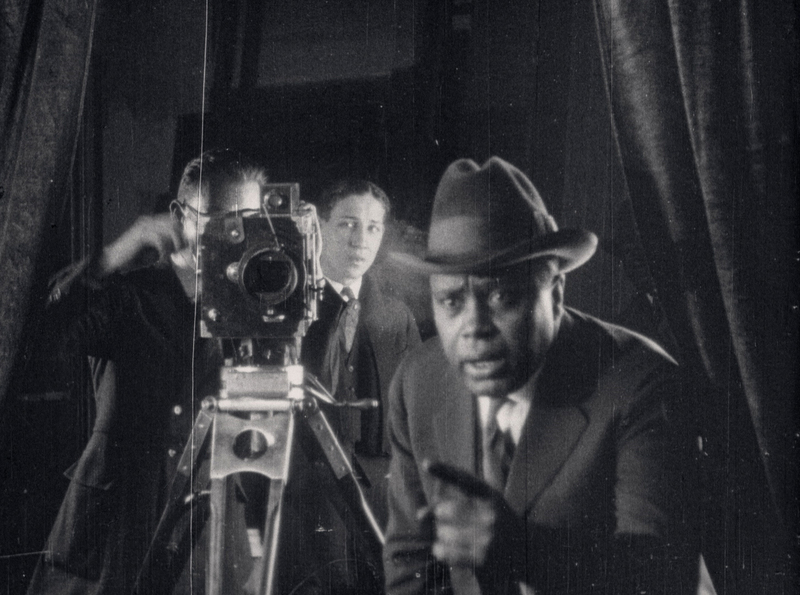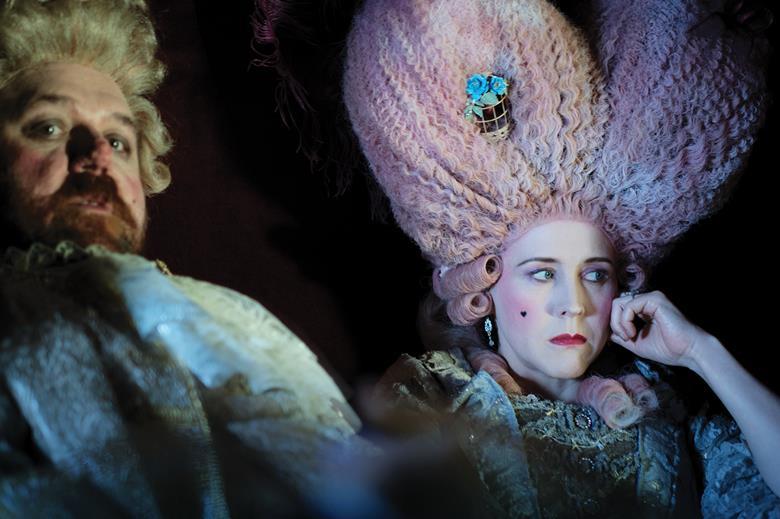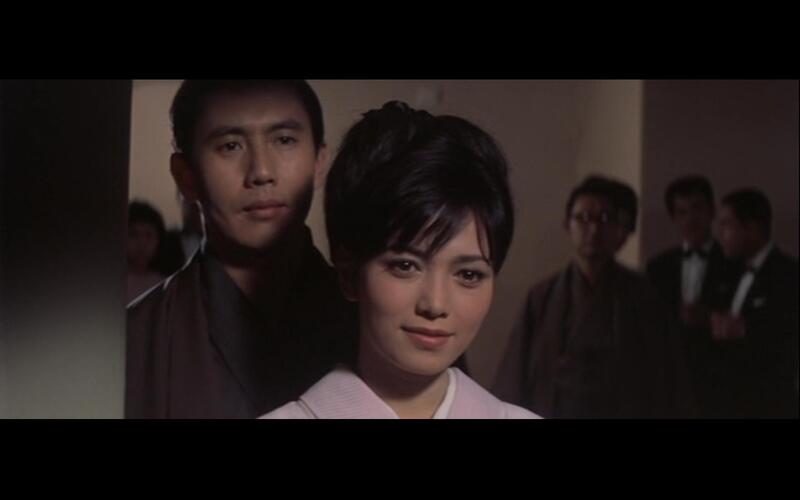
The Visionary Filmmaker Who Defied Hollywood
MOVIE REVIEW
Oscar Micheaux: The Complete Collection (Blu-ray)
–
Genre: Silent, Drama, Musical
Year Released: 1920-1940, Kino Lorber Blu-ray 2025
Runtime: 16h 10m
Director(s): Oscar Micheaux
Cast: Paul Robeson, Evelyn Preer, Carman Newsome, Alice B. Russell, Lorenzo Tucker, Alec Lovejoy
Where To Watch: available now, order here: www.kinolorber.com or www.amazon.com
RAVING REVIEW: Few filmmakers deserve the legacy and historical significance of Oscar Micheaux. A true pioneer of independent cinema, Micheaux operated outside the Hollywood system, crafting films that directly challenged racial stereotypes and provided an unfiltered lens into the lives of Black Americans in the early 20th century. Now, OSCAR MICHEAUX: THE COMPLETE COLLECTION combines every surviving film from the groundbreaking director, from his earliest silent work to his later sound films. This five-disc collection features 17 films, including seven newly restored classics, alongside trailers and contextual materials that give modern audiences a deeper understanding of his impact.
The collection's heart is WITHIN OUR GATES (1920), Micheaux’s most well-known silent feature and a direct response to D.W. Griffith’s THE BIRTH OF A NATION (1915). In contrast to Griffith’s racist mythologizing, Micheaux’s film exposes the horrors of lynching and systemic racism through the journey of a young schoolteacher trying to secure funding for an all-Black school. The film’s structure is fragmented, moving through past and present with an intensity that remains unsettling even a century later. Though not all of Micheaux’s silent films have survived, WITHIN OUR GATES endures as a foundational work in Black cinema, now painstakingly restored to its fullest possible form.
Similarly, THE SYMBOL OF THE UNCONQUERED (1920) further explores racial identity and land ownership themes. It follows a Black woman who inherits land but is forced to navigate racial prejudice and self-doubt. Micheaux uses intertitles and storytelling to depict the societal forces that sought to strip Black landowners of power. While the film was long considered lost, portions were rediscovered, and the version presented in this set represents the most complete edition available today.
One of the true highlights of the collection is BODY AND SOUL (1925), notable for featuring the screen debut of Paul Robeson, who plays dual roles as an unscrupulous preacher and his morally upstanding twin. The film is a condemnation of religious hypocrisy, exploring how faith can be used both as a tool for empowerment and a weapon for manipulation. Robeson’s commanding presence is already undeniable in his first screen appearance, foreshadowing the legendary career he would go on to have. The film’s psychological complexity and critique of corrupt institutions make it one of Micheaux’s most compelling narratives.
Micheaux’s transition into sound films is represented in this set by THE EXILE (1931), his first full-length talkie and the first sound feature by a black filmmaker. The story follows a black man attempting to escape his troubled past by settling in the West. The film embraces the conventions of the Western genre while still centering a uniquely Black experience. While audio recording is primitive by today’s standards, Micheaux’s leap into sound filmmaking reflects his constant ambition to push boundaries.
From there, Micheaux’s work in the 1930s showcases a continued refinement of his themes. THE GIRL FROM CHICAGO (1932) blends romance with a crime narrative, following a federal agent who takes down a criminal syndicate. While the budget limitations are evident, Micheaux’s eye for socially relevant storytelling shines through, particularly in how he positions Black law enforcement figures within a larger struggle for justice.
That same year, Micheaux experimented with genre and structure in TEN MINUTES TO LIVE (1932), a two-part narrative that mixes suspense and humor. The first segment follows a nightclub singer stalked by a mysterious figure, while the second veers into absurd comedy as a producer attempts to launch a film career. The uneven tonal shifts are emblematic of Micheaux’s willingness to take risks, even if they don’t always fully connect.
With VEILED ARISTOCRATS (1932), Micheaux revisits the theme of racial passing, a subject he had tackled in earlier lost works. Here, he examines the psychological burden of tackling multiple identities in a racially segregated society. The film critiques not just external racism but the internalized colorism that led some to distance themselves from their Black heritage.
Unfortunately, not all of Micheaux’s works survived. The collection includes only a trailer for HARLEM AFTER MIDNIGHT (1934), a lost film. This brief fragment is an invaluable piece of film history, hinting at yet another engaging crime drama that is now relegated to history.
Micheaux's storytelling was more polished with MURDER IN HARLEM (1935), a drama loosely inspired by the infamous 1913 Leo Frank case. A Black man finds himself wrongfully accused of murder, and Micheaux uses the framework of the mystery genre to deconstruct the racial bias within the American legal system. While the film is a remake of his earlier, now-lost silent film, THE GUNSAULUS MYSTERY, this version remains a compelling example of how Micheaux repeatedly reworked and refined his ideas.
Another unfortunate loss to film history is TEMPTATION (1936), which, like HARLEM AFTER MIDNIGHT, exists only as a trailer. While the surviving footage offers a brief look at Micheaux’s later stylistic flourishes, the full extent of the film’s narrative remains unknown.
Micheaux continued experimenting with the genre in UNDERWORLD (1937), a crime drama that leans into the conventions of gangster films of the era while maintaining his signature social critiques. SWING! (1938) shifts gears entirely, immersing itself in the vibrant musical culture of the time and celebrating Black artistry and entertainment in a way that few mainstream films of the period did.
GOD’S STEP CHILDREN (1938) is one of Micheaux’s more controversial works. It critiques a light-skinned Black woman who attempts to pass for white, portraying her decision as ultimately destructive. While Micheaux often tackled passing in his films, this work is frequently discussed for its internalized colorism and complex portrayal of self-identity.
With BIRTHRIGHT (1939), Micheaux revisits the story of an educated Black man returning to his Southern hometown to improve conditions for his community, only to face resistance from within and outside his race. The film critiques classism and internal divisions within Black communities, a theme Micheaux returned to repeatedly.
LYING LIPS (1939) blends romance, music, and mystery, centering on a singer accused of a crime she didn’t commit. While constrained by budgetary limitations, the film benefits from its charismatic cast and lively musical performances.
Micheaux’s final known surviving film, THE NOTORIOUS ELINOR LEE (1940), is a noir-inspired crime narrative that demonstrates his continued ability to craft engaging, suspenseful stories even as the limitations of the independent film industry persisted.
Beyond the films, this collection provides crucial extras, including introductions by series curator Rhea L. Combs, a printed booklet of film notes, and theatrical trailers for select films. These additions help contemporary viewers appreciate Micheaux’s pioneering spirit and the sheer ambition of his career.
For anyone interested in Black film history, early independent cinema, or the evolution of socially conscious storytelling, OSCAR MICHEAUX: THE COMPLETE COLLECTION is a must-have. These films, many of which were created with limited resources and against immense institutional opposition, remain some of the most vital works in American film history. While not every entry is a masterpiece, Micheaux’s vision, determination, and refusal to conform make this collection a fascinating and necessary experience for cinephiles and historians alike.
Full Films (Complete or Surviving Versions):
Within Our Gates (1920)
The Symbol of the Unconquered (1920)
Body and Soul (1925)
The Darktown Revue (1931)
The Exile (1931)
The Girl from Chicago (1932)
Ten Minutes to Live (1932)
Veiled Aristocrats (1932)
Murder in Harlem (1935)
Underworld (1937)
Swing! (1938)
God’s Step Children (1938)
Birthright (1939)
Lying Lips (1939)
The Notorious Elinor Lee (1940)
Trailer-Only Films (Lost Films, No Full Print Exists):
Harlem After Midnight (1934) – Only a trailer remains.
Temptation (1936) – Only a trailer remains.
Please visit https://linktr.ee/overlyhonestr for more reviews.
You can follow me on Letterboxd, Instagram, Twitter, and YouTube. My social media accounts can also be found on most platforms by searching Overly Honest Reviews.
I’m always happy to hear from my readers; please say hi or send me any questions about movies.
[photo courtesy of KINO LORBER, LIBRARY OF CONGRESS]
DISCLAIMER:
At Overly Honest Movie Reviews, we value honesty and transparency. Occasionally, we receive free items for review, including DVDs, Blu-rays, CDs, Vinyl, Books, etc. We assure you that these arrangements do not influence our reviews, as we are committed to providing unbiased and sincere evaluations. We aim to help you make informed entertainment choices, regardless of our relationship with distributors or producers.
Amazon Affiliate Links:
Additionally, this site contains Amazon affiliate links. If you purchase through these links, we may receive a commission. This affiliate arrangement does not affect our commitment to honest reviews and helps support our site. We appreciate your trust and support in navigating these links.



Average Rating